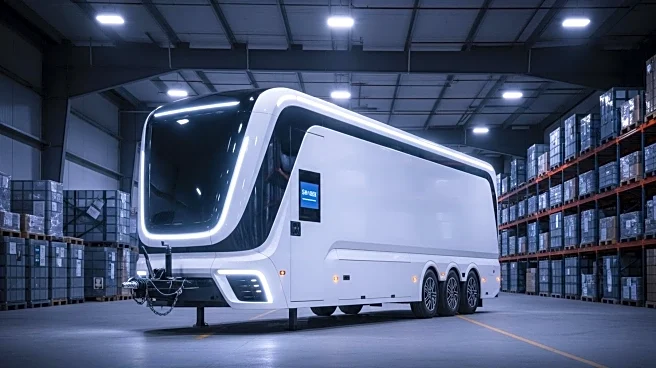What's Happening?
C.H. Robinson has launched its Asset Management System (AMS) as part of the Drop Trailer Plus program, aimed at enhancing visibility and efficiency in refrigerated and dry trailer operations. The system integrates GPS tracking, telematics data, and AI-powered analytics to transform trailers into intelligent, connected assets. This technology provides real-time location and status updates, helping shippers minimize downtime and optimize loading schedules for temperature-sensitive freight. Key features include improved utilization, real-time visibility, proactive exception management, and theft prevention. Adam McDonough, C.H. Robinson VP of truckload, emphasized the system's ability to streamline operations and reduce costs.
Why It's Important?
The introduction of the AMS represents a significant advancement in logistics technology, offering potential cost savings and operational efficiencies for shippers and carriers. By providing real-time data and insights, the system can help reduce waste, improve trailer availability, and enhance overall supply chain performance. This development is particularly relevant for industries reliant on temperature-sensitive goods, such as food and pharmaceuticals, where precise logistics are crucial. The AMS also addresses security concerns by preventing theft and fraud through enhanced tracking capabilities.
What's Next?
C.H. Robinson is likely to continue expanding the AMS across its network, potentially integrating additional features and capabilities based on user feedback and technological advancements. The company may also explore partnerships with other logistics providers to extend the system's reach and impact. As the AMS gains traction, it could set new standards for trailer management and visibility in the logistics industry, prompting competitors to adopt similar technologies to remain competitive.
Beyond the Headlines
The deployment of advanced logistics technologies like the AMS highlights the growing importance of data-driven decision-making in supply chain management. As companies increasingly rely on real-time analytics to optimize operations, issues related to data privacy and cybersecurity may become more prominent. Ensuring the security of sensitive information and maintaining trust with stakeholders will be critical as the industry continues to evolve.












